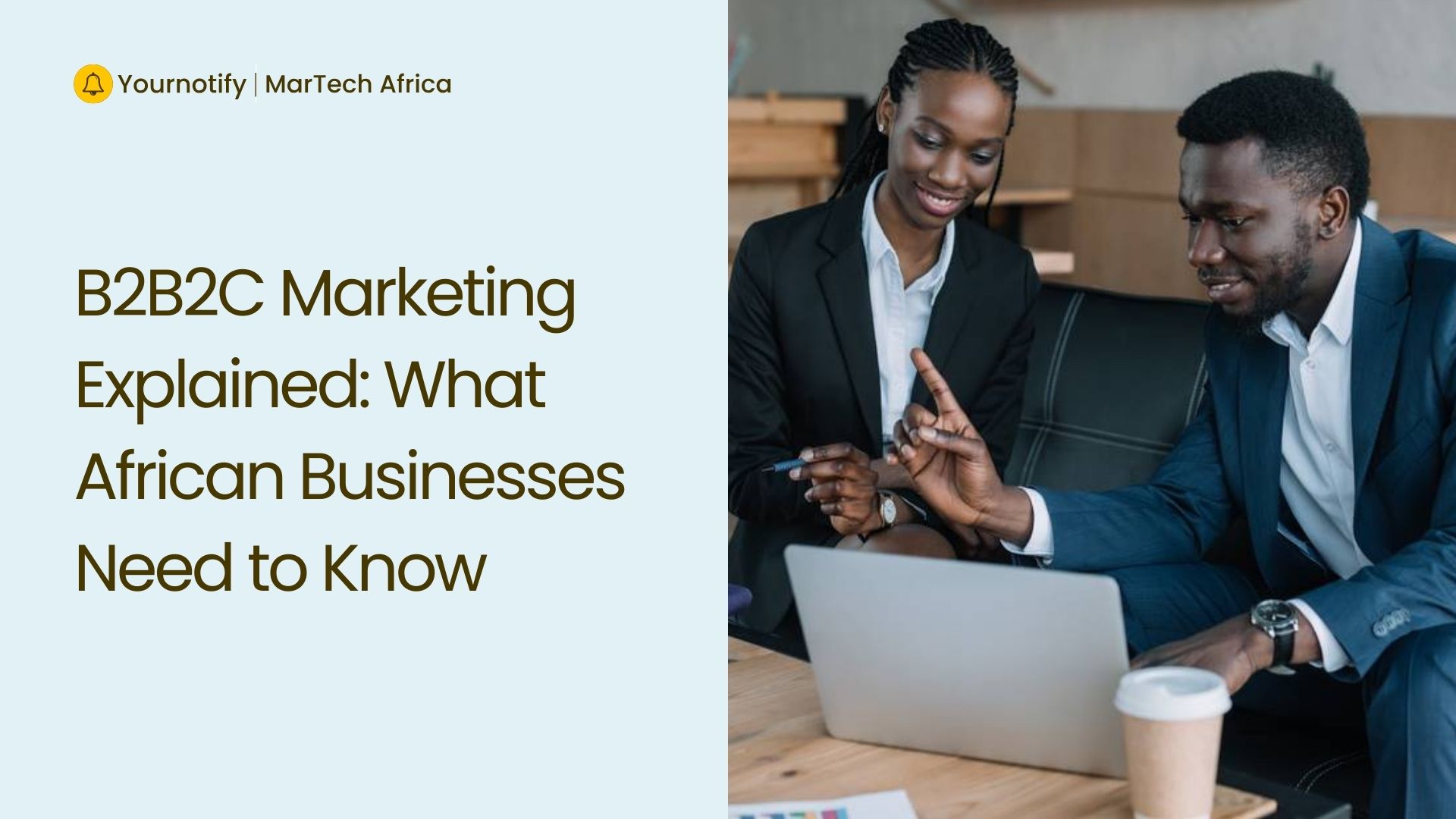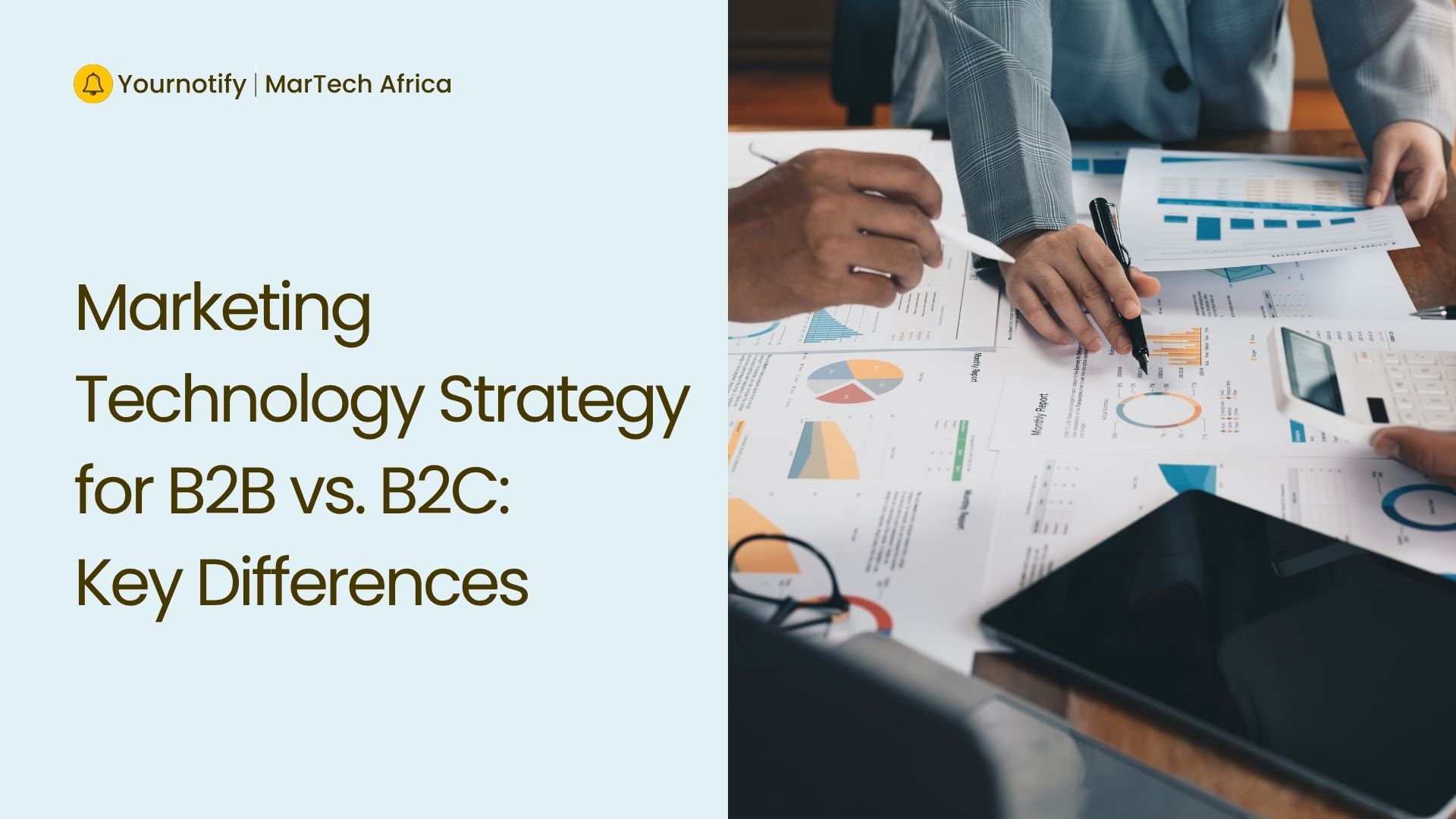Launching and scaling a startup in Africa is both exhilarating and daunting. With over 1.1…

B2B2C Marketing Explained: What African Businesses Need to Know
The African business landscape is unique. There are the bustling open-air markets and informal retail shops to rapidly expanding e-commerce platforms and social commerce on WhatsApp, businesses have to navigate diverse and complex routes to reach customers. This is where B2B2C marketing (Business-to-Business-to-Consumer) comes in. It is not a new concept globally, but in Africa, it is becoming one of the most practical and scalable models for connecting brands to consumers while reducing the cost of customer acquisition.
What is B2B2C and Why Does it Matter?
In simple terms, B2B2C means:
You (the business) – Partner business (retailer, platform, or distributor) – Consumer.
The partner gives you reach and credibility, while you take ownership of the consumer relationship through branding, support, and ongoing engagement.
Why it matters for Africa:
- Mobile internet use is growing but not universal. By 2023, only 27% of Sub-Saharan Africans had mobile internet access, while 44% had a mobile subscription. Partnerships with retailers, telcos, and cooperatives help bridge this digital gap. GSMA Mobile Economy Report 2024
- Mobile money is mainstream. 33% of adults in Sub-Saharan Africa now have a mobile money account, making payments easier for B2B2C transactions.
- SMEs dominate. Globally, SMEs make up 90% of all businesses and over 50% of jobs, and in Africa, they’re often the gateway to consumers.
- Social commerce is booming. Surveys show 54% of African social media users have bought or sold products on platforms like WhatsApp and Facebook.
Together, these factors make B2B2C an ideal model for businesses looking to scale efficiently.
How B2B2C Marketing Works in Practice
Partner Acquisition
The first step in a successful B2B2C strategy is identifying and onboarding the right partners. These are organizations that already have strong relationships with consumers, such as informal retailers, pharmacy chains, cooperatives, or digital marketplaces. The goal is to leverage the partner’s existing trust and credibility.
In Africa, consumers often rely on familiar shops, local distributors, or community networks for their purchasing decisions. By working with trusted partners, brands can reach customers who might otherwise be difficult or costly to acquire directly.
This approach also reduces the risk of low adoption and ensures that your products or services are placed where customers are already shopping.
Joint Marketing
Once partners are on board, the next step is to jointly market to the end consumer. This involves leveraging the partner’s communication channels, whether that’s in-store displays, WhatsApp groups, SMS campaigns, or integrations within partner apps.
By using the partner’s existing network and credibility, businesses can amplify their message and create awareness without starting from scratch. Joint marketing also allows for co-branded campaigns that benefit both the partner and the brand, creating a sense of shared value while increasing visibility and trust among consumers.
Consumer Activation
Even though sales occur through a partner, it is essential for brands to capture direct relationships with the end consumer. This is where consumer activation comes in. Brands can encourage customers to register via SMS, WhatsApp, or loyalty programs, collect their preferences, and capture their purchase behavior.
This first-party data is invaluable—it allows brands to engage with consumers directly, provide personalized offers, and continue building loyalty. Without this step, the relationship is entirely mediated by the partner, and the brand loses control over post-purchase engagement.
Ongoing Relationship
The final step in the B2B2C journey is nurturing the ongoing relationship with consumers. After the initial purchase, brands should continue interacting with customers through tips, after-sales support, warranty reminders, or reward programs. This engagement ensures that consumers remain connected to the brand rather than just the partner.
It also encourages repeat purchases, strengthens brand loyalty, and helps convert first-time buyers into long-term advocates. In African markets, where customer trust and brand recognition take time to build, maintaining a consistent and value-driven relationship is key to sustaining growth.
Common Pitfalls to Avoid in B2B2C Marketing
Treating B2B2C Like Pure Wholesale
Approaching B2B2C as traditional wholesale focuses only on moving products through partners. Without capturing first-party data or engaging end customers, the brand risks losing visibility and loyalty. Use loyalty programs, SMS/WhatsApp engagement, or warranty registrations to maintain direct touchpoints.
One-Size-Fits-All Incentives
Partners have different motivations. Retailers may prioritize margins, pharmacies credit terms, and agent networks product turnover. Uniform incentives often underperform. Tailor partner economics to each segment to keep them motivated and aligned with your goals.
Ignoring the Last Mile
Delivery reliability, inventory at retail points, and after-sales support are critical. Even strong marketing cannot fix poor last-mile execution. Focus on logistics, on-the-ground support, and proactive problem-solving to protect the consumer experience and brand reputation.
Compliance Blind Spots
Operating in regulated sectors like finance, health, or insurance requires adherence to licensing and data privacy laws. Don’t rely solely on partners’ compliance. Establish clear agreements, monitor practices, and provide training to mitigate legal and reputational risks.
B2B2C marketing is one of the most practical frameworks for African businesses today. By leveraging trusted intermediaries, businesses can reach consumers more efficiently, reduce acquisition costs, and still build direct relationships with their customers.
The combination of growing mobile penetration, widespread mobile money adoption, the dominance of SMEs, and the rise of social commerce makes this the right moment for African businesses to embrace B2B2C. Those who succeed will be the ones that understand the importance of building through partners but never forgetting to build with the customer in mind.
Related Content
How Shuttlers B2B2C Marketing Strategy Is Fixing Daily Commutes in Lagos


